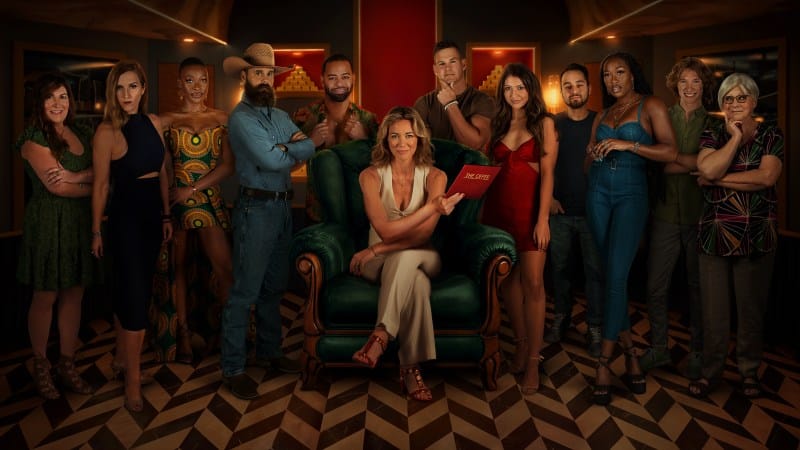
In the realm of reality television, where intrigue and deception take center stage, Lindsey Anderson emerges as a key player in the Netflix series “The Trust: A Game of Greed.” Renowned as a seasoned online business consultant with over two decades of experience, Lindsey’s foray into the world of high-stakes social experiments adds a unique dimension to her multifaceted career.
Lindsey Anderson: Beyond the Business World
As a veteran in the online business and digital marketing industry, Lindsey Anderson has been instrumental in helping hundreds of entrepreneurs scale their businesses. With her coaching programs and The Build And Monetize Agency, Lindsey has honed proven systems and strategies for success. The author of the best-selling book “The Click Technique,” Lindsey’s influence extends to podcasts, events, and organizations worldwide.
In Netflix’s “The Trust: A Game of Greed,” Lindsey steps out of the boardroom and into the competitive villa where eleven strangers grapple with the complexities of trust, greed, and human nature. As a contestant, Lindsey brings her strategic mindset and business acumen to the forefront, navigating the challenges of a game designed to expose the true character of its participants.
Netflix’s “The Trust: A Game of Greed” Unveiled
“The Trust: A Game of Greed” is Netflix’s eight-part reality series that delves into the intricate theme of greed. Hosted by Brooke Baldwin, the show presents eleven contestants with a quarter of a million dollars to split evenly. The catch? They must decide whether to share the money equally or vote each other out to keep more for themselves. It’s a psychological battle where greed and mistrust threaten to unravel even the strongest of relationships.
The format is a departure from traditional reality competitions. Contestants do not face elimination, but the prize pot increases as more participants are voted out. Each vote casts a shadow of mistrust, fostering an environment where alliances are tested, friendships strained, and deceit becomes a strategic tool for survival.
Lindsey Anderson’s Role in the Game
As one of the contestants, Lindsey Anderson, the seasoned business consultant, brings a wealth of experience to “The Trust.” In a villa filled with diverse backgrounds, Lindsey navigates the challenges of maintaining alliances while considering the allure of a larger share of the prize money.
The show introduces an intriguing twist—contestants are given opportunities to anonymously vote each other out, increasing their individual share of the total prize pot. The dynamic nature of the game, coupled with Lindsey’s strategic prowess, promises to keep viewers on the edge of their seats.
The Evolution of Reality TV
“The Trust: A Game of Greed” joins a wave of high-concept reality shows that push individuals to their limits, both mentally and emotionally. Building on the success of shows like “The Traitors” and “Squid Game: The Challenge,” Netflix explores the human psyche in a captivating social experiment.
The show challenges the conventional norms of reality TV, offering viewers a glimpse into the darker, more complex facets of human behavior. As the genre evolves, Lindsey Anderson’s participation in “The Trust” reflects a broader shift towards more intricate, thought-provoking, and socially experimental content.
The Trust’s Intricate Gameplay
“The Trust” introduces a unique gameplay that distinguishes it from other reality shows. Unlike traditional elimination formats, contestants are not removed from the competition. Instead, they face the constant dilemma of whether to cooperate for an equal share of the prize money or succumb to the temptation of greater individual gains by voting others out.
This dynamic creates an ever-shifting social landscape, where alliances are formed and broken based on the strategic decisions made by each contestant. The introduction of The Vault, a tempting space where players can make deals to eliminate others for personal gains, adds another layer of complexity to the game. Lindsey Anderson, with her background in strategy and business, is poised to navigate these intricate dynamics with finesse.
The Psychological Underpinnings
At its core, Netflix’s “The Trust: A Game of Greed” delves into the depths of human psychology. The show explores how individuals react when faced with the opportunity to prioritize personal gain over collective success. The decision-making process, shrouded in anonymity, forces contestants to confront their ethical boundaries and question the true nature of trust.
Lindsey Anderson’s role in this psychological experiment becomes particularly intriguing. As a business consultant accustomed to making strategic decisions, her approach to the game may mirror her professional expertise. The show not only tests the contestants but also invites viewers to reflect on their own moral compass and the extent to which they would go for financial gain.
The Interplay of Trust and Deceit
“The Trust” amplifies the age-old tension between trust and deceit, turning it into a gripping narrative. Contestants must grapple with the consequences of their actions, knowing that every vote has repercussions not only for the individual voted out but for the entire group. The show’s tagline, “In this game, everyone starts as winners and they can all leave as winners – if they choose to share,” encapsulates the central theme of balancing personal ambition with collective success.
Lindsey Anderson, as a participant in this intricate dance of trust and deceit, adds layers of complexity to the narrative. Her strategic mindset, combined with the unpredictability of the game, makes for compelling viewing as alliances form, dissolve, and reform in the pursuit of the coveted prize.
A Cultural Phenomenon
“The Trust: A Game of Greed” aligns with the broader trend of reality TV evolving into a cultural phenomenon that goes beyond mere entertainment. With themes that resonate with the complexities of human nature, the show taps into a collective fascination with observing how individuals navigate moral dilemmas, form alliances, and grapple with the consequences of their decisions.
In an era where viewers crave more profound connections with reality TV content, “The Trust” provides a nuanced exploration of human behavior under the influence of greed and mistrust. Lindsey Anderson’s involvement in the show elevates it from a mere competition to a social experiment with far-reaching implications.
Reality TV’s Golden Age
The emergence of high-concept reality shows like “The Trust,” “The Traitors,” and “Squid Game: The Challenge” signals a potential golden age for reality television. Audiences, it seems, are increasingly drawn to narratives that challenge participants mentally and emotionally, breaking away from the conventional tropes of reality TV.
Shows like “Survivor,” “Big Brother,” and “Squid Game: The Challenge” fall into this category of reality competitions that push boundaries and explore the depths of human resilience. Viewers are not just passive observers; they become detectives, analyzing strategic moves and moral dilemmas, and investing emotionally in the outcomes of the games.
The Rise of High-Concept Reality TV
“The Trust: A Game of Greed” aligns with the rise of high-concept reality TV that immerses participants and viewers in elaborate scenarios designed to test human behavior. The show’s unique format challenges the traditional notion of competition and elimination, offering a fresh perspective on how individuals respond to challenges and opportunities.
With its intricate gameplay, psychological underpinnings, and the interplay of trust and deceit, “The Trust” exemplifies the evolution of reality TV into a sophisticated and thought-provoking genre. Lindsey Anderson’s involvement in this cultural shift reflects not only her willingness to explore new horizons but also the growing appetite among viewers for content that transcends the boundaries of traditional reality television.
Conclusion
Lindsey Anderson’s participation in Netflix’s “The Trust: A Game of Greed” showcases the convergence of business acumen and strategic thinking in the uncharted territory of high-concept reality TV. As a seasoned online business consultant, Lindsey’s journey in the show offers viewers a glimpse into the complexities of human behavior when faced with moral dilemmas and financial temptations.
“The Trust” emerges as a cultural phenomenon, contributing to the golden age of reality television by embracing intricate narratives, psychological challenges, and the blurred lines between trust and deceit. Lindsey Anderson’s role adds depth to the unfolding drama, making “The Trust” a must-watch for those seeking a nuanced exploration of human nature within the realm of competitive entertainment. As reality TV continues to evolve, Lindsey’s venture into “The Trust” exemplifies the genre’s capacity to captivate audiences and provoke thoughtful reflection on the intricacies of the human experience.

